- Home
- Barry Unsworth
The Hide Page 4
The Hide Read online
Page 4
This evening I positioned myself there more from habit than anything else. I was still shaken by the edict of my sister’s, the effort of keeping the binoculars steady was greater than usual, and in the event I saw nothing but the flash of bare arms briefly raised in the bedroom. However, had I not been there, standing there beside the hedge, at a few minutes to seven, I should not have witnessed the passing through the gates of Mrs King and I should probably have forgotten once again that this evening was the supper party for the members of the Dramatic Society committee. Mrs King has a square, mannish face, flushed at this moment from the exertion of walking; she is wearing a belted blue raincoat of a sort that defies lecherous speculation even more efficiently than it excludes the wet. Mrs King has almost no neck. In the plays put on by the Drama Group she is experienced, maternal, décolletée, with powdered shoulders, wearing strings of what will pass for pearls. It is surprising how, whatever the play, the members of the Dramatic Society seem always to enact the same roles and dress in the same manner. I make a point of seeing these productions because I am convinced that Audrey’s aberrations need to be carefully watched. I slip in when the play has started and leave before the end. If my presence there has been noted Audrey has never mentioned it. She has not been given, up to now, any but the most minor roles.
Mrs King is followed after some moments by Miss Gravelin and Mr Dovecot who have presumably met by chance in the vicinity. They are both reacting in their different ways to the accident of being together; Dovecot angular and jugular with a thin and melancholy nose. Gravelin pony-tailed, aiming at the junoesque, stepping on her large feet as though about to launch on a ballet sequence, with a nose and chin that are always too neighbourly, too eager to meet. These two are accustomed to provide whatever romantic interest the play contains: she with an unvarying brand of archness, he too frantic in the region of the Adam’s apple. They pass along the drive, Gravelin talking continuously about some people she has apparently been staying with in Edinburgh, looking straight ahead; Dovecot inclined towards her, his long straight hair flopping down over his brow. She is wearing, I notice chiefly, a skirt with a pattern of what seem to be pineapples, though mauve in colour, he a clerkly sort of suit. They pass out of sight but Gravelin’s voice I hear some moments longer; ‘And they always called me Annie, never Anne. My name of course is Anne, but they always said Annie, as you might say Jeanie or Joanie. . . . ’ Gravelin’s conversation centres almost always round some one of her own attributes.
Major Donaldson and Miriam Daintry still to come. I wait there for five or six minutes more, but nothing happens. The bungalow door is shut, its windows dark and inexpressive. The sun has set and in the luminous pallor of the sky beyond the bungalow, numbers of swifts are wheeling. I set off walking up the drive towards the house. Just before the final bend I hear the sound of a car approaching. I stand well to the side and wait. It is Donaldson in his green Rover. I catch a glimpse of a tweed cap, a silvery moustache. He toots his horn to me. I begin a sort of wave then at the last moment convert this into a military salute, coming at the same time to attention.
Only Miriam now. She will arrive late, of course, make an entrance. Her eyes heavily made up in an oriental fashion, her temple-bell earrings. She aims at the exotic but misses at the extremities, having large coarse hands and no ankles to speak of. She is my sister’s friend. She plays fallen women or apparently wicked women with pasts full of sin and shame and wardrobes full of black velvet dresses, who in the end sacrifice themselves for love. I am visited now, as I approach the house, by a rush of detestation for Miriam: it is she I am sure I have to thank for this decision of Audrey’s to engage a gardener. I can hear them discussing it, over coffee, at the Metropole at a corner table with a view of the sea. Entering the house, mounting the stairs I become convinced that this is so, I see Miriam in a cossack hat and knee-length boots—it is March let us say—speaking with the inane vehemence of her sort in the restaurant of the Metropole: ‘My dear you must have it seen to, people are beginning to notice, it is so overgrown.’ Nodding her Cossack head. ‘You owe it to dear Howard’s memory, have you thought of it in that light?’ And my sister, my sister would say, ‘Do you really think so?’, enjoying her role of lonely little woman, her will coiled up tight as a steel spring inside her. . . .
I unlock my bedroom door and enter. I wash and change into my grey pinstripe suit. I shall have to attend this supper party, of course, however unattractive the prospect and however unwelcome my presence. After this bombshell of Audrey’s I cannot afford to neglect anything.
In the hall, however, I hesitate. Voices come to me from the drawing-room, Miriam Daintry’s among them; she has arrived then. I experience a sudden painful emotion, almost like grief, at my isolation. Their tones as they talk together are no more divisible, no more individually meaningful to me than the clamour of rooks or frogs. I am not of the tribe.
I overcome this feeling and pausing only to check the elegant inch of shirt below my cuff, I enter the room. Conversation ceases immediately, there is a hush. Nobody of course has been expecting me to appear, least of all Audrey. It has become tacitly agreed between us that on such occasions, when she is entertaining, I shall keep away. Now I have created an awkward situation. I make gestures of salutation to the seated committee members, and once more check my cuffs.
‘So glad you were able to join us, Simon.’ Audrey takes her duties as hostess very seriously. I can see the lines of strain conflicting with her gracious smile. She is flushed along the cheek bones. ‘Get yourself a drink,’ she says. ‘You know where everything is.’ I am surprised at understanding these words easily when outside the door I had felt so excluded; I do not believe her words are aimed at me, however: it is a fragment detached from the tribal colloquy, a fragment unexpectedly intelligible.
‘Evening, Thebus,’ the Major says. ‘How are you keeping?’
‘Fair to middling,’ I say in a bluff forthright manner. ‘How’s yourself, Major?’ Turns of phrase which, five minutes before, I could not have conceived myself employing. I move over to the sideboard against the wall. The drinks are at the near end of it, food covers the rest. Marion has been busy all day with this. I cast my eye over it: ham, beef, brawn on great oval dishes flanked by mustard and chutney: the usual concomitants of salads, gleaming and oleaginous; a wooden board with various cheeses, riddled, fissured or smooth; a wicker bowl of fruit. Pride of place, right in the centre, goes to the vast domeshaped chocolate mousse, darkly shining on its platter. Measuring out my gin, I eye the glistening slopes of the mousse; motionless now but infinitely impressionable, on the brink or at the last throb of some diapason of wobbles and quakes. Behind me I hear the conversation picking up again with:
Yes, the voice was impressive, considered as a voice—
Marvellous voice we thought, but as it turned out—
We thought give him a try for heaven’s sake—
Absolutely calamitous, yes—
He couldn’t walk on even—
He didn’t know what to do with his hands—
He couldn’t look anybody in the eye—
The words of the tribe. As self-contained as the dome of mousse. He sounds remarkably like myself, the man they are discussing, except for the marvellous voice. My own voice is remote and reedy. One of the most ancient of shapes, the dome. The shape of the heavens as it seems to mortals. The shape of the Dramatic Society. How dare they exclude me in this way. How dare Audrey allow boys to roam at will, engage gardeners behind my back. My tunnel, two years’ work, threatened because of this whim. Resentment rises in me, and the desire for revenge. Why should I always be on the outside of everything, appreciating my exclusion with an aesthetic ache? Suddenly I see a way, tempting but alarming too, I see a way of compelling this world to contain me. My back is on their tribal twittering, I am holding my gin and tonic, looking fixedly at this Womb of Being, this chocolate mousse. Its perfection of shape increases my antagonism. Quickly I glance over my shoulder.
No one is looking at me. I can struggle against temptation no longer. It is the work of a moment to raise my hand to my mouth, as if to suppress a belch or yawn, extract the false teeth from my upper jaw and drop them delicately and quite irrevocably into the very centre of the mousse, which now at this test demonstrates its superb lightness of texture—we certainly have a treasure in Marion—by parting with what I swear is the faintest of hisses and sighs, admitting the teeth and closing over them almost completely—the slightest of indentations. It is really as though my teeth are made welcome.
Mistaking my immediate panic for exhilaration I turn about briskly, intending to insert myself into the conversation too, with some remarks about bird song in our local woods, but realise immediately that I cannot now speak to anyone nor indeed invite close scrutiny. There are a number of consonants I cannot now pronounce without a rather disgusting sibilance. Decidely I am hors de combat.
This sense of physical disability intensifies my alarm. I begin to wish very much that I had not dropped my teeth into the mousse. Still holding, or to be more exact clutching my glass, I leave the sideboard and saunter over to a corner of the room out of the direct light. Here I sit, a little turned away, presenting the right side of my face. The conversation is continuing:
‘It brings me back to a point I’ve made before, if you ladies will bear with me. . . .’ That is the Major, isn’t it, yes, leaning forward in his grey flannel suit, hitching up the trousers slightly, getting ready to give the ladies a briefing. I wonder again what he can be doing in this galère. He plays butlers and business men and fathers of rebellious children, with uniform woodenness. What does he want with all this after the years of pink gins and mild curries, talk of promising popsies and conscientious corporals, indoor rugby on Regimental Dinner Nights, snoozing in leather armchairs in Cairo, Camberly, Gib, his hold on the air-mail edition relaxing?
‘What we need is a professional producer, someone with the professional know-how—’
‘Oh, but Major Donaldson.’ Audrey leans forward too, moving her shoulders under the lilac-coloured cardigan. ‘Oh, but our amateur status is the thing about us really, isn’t it? I mean, this is our thing, not being commercial in any way. . . .’ A professional might be coarsely commercial enough to tell her she can’t act.
‘Quite right, my dear.’ Snap of thin lips, Miriam Daintry. She wants no outsiders either, no lessening of power. She put thoughts of a gardener into Audrey’s head, I am convinced of it. I hope she gets the teeth. I hope no one gets the teeth. It was madness to drop them into the mousse. Bound to be detected. Unless—and here I see a modicum of hope—unless they have sunk too deep to be reached in the course of first helpings. Surely after all that ham and beef and potato salad no one will be clamouring for seconds of mousse? I notice in myself increasing symptoms of unease. My palms moisten, I have a tendency to yawn.
‘I remember once working for a professional producer. It was in Nottingham.’ Ah yes, that is Gravelin, attempting to reclaim the conversation from these abstractions. ‘Very competent, of course, but outside of work he was a terror.’ Her large shining eyes play over us. We are meant to be wondering about the relations between Gravelin and this terrible producer outside of work. After the statutory pause she will enlighten us, at length. I hope Gravelin gets the teeth.
‘He was like all these very artistic people, he couldn’t resist beauty, simply couldn’t keep—’
She is cut off by Audrey who says with the gracious smile I know so well, ‘Professionalism, I think, is the curse of much of our life today, don’t you think so, Major?’
‘What do you think, Thebus?’ asks the Major, taking me completely by surprise. ‘You’re a man of the world.’
This unexpected question, coming at a time of grave misgiving and physical disability, is almost too much for me. I am almost overcome. I control myself, however, stiffen my twitching features and, keeping my head averted and my upper lip as motionless as possible, pronounce the word ‘Definitely’ —all sounds within my present range. There is a longish pause, as though people are expecting something further, but I sit with my face averted, gazing fixedly at a painting of moorland ponies on the wall. I attempt a gesture of finality, forgetting the gin, some of which spills on to my trousers. After several more moments stark scrutiny of ponies and heather, I hear Audrey saying, ‘Shall we have supper now?’ Intent on saving the situation. People gather round the sideboard, return to their places with heaped plates. There they sit, knees together under napkins. I can eat nothing, of course, but must make some pretence. There is beer and there is burgundy, but I have no heart for either. My gaze returns repeatedly to the ponies.
Gravelin waits till people are helpless, their mouths full of salad, and then begins again. Now she is speaking about the tender and beautiful relationship she has with her mother.
‘No thank you, dear lady,’ I hear the Major say. ‘No more. It was very good indeed, excellent. Mousse? Well, yes, perhaps a little. . . .’
Now for it. Of course, had I said at the time with light laughter, Oh, how silly of me, my teeth have fallen into the mousse, I shall have to dig them out, so sorry, what a contretemps, then it might have passed off. Simply, no one could then have partaken of the mousse; the symmetry of the feast would have been destroyed. But an asymmetrical feast is not so bad as a traumatic one. Now it is too late.
I watch the Major furtively as he freights his spoon with mousse, conveys it up towards the silver-grey moustache. No foreign body there. Others now are accepting mousse, everyone it seems is eager to get at it. Except Gravelin, whom talking has delayed.
‘I am hungry,’ she says, ‘around about supper time, generally speaking, around about this time, yes, I will have a little more ham, quite delicious, thank you.’
I rise, carry my untouched plate to the sideboard where I leave it in an inconspicuous place. Making use of the large spoon left there for the purpose, I help myself to an enormous heap of mousse. I probe into the heart of what remains, but feel no obstruction. The teeth are already served then, already dished out. Perhaps, perhaps in mine. I return to my place in the corner, attack the mousse immediately, nothing, nothing at all. The glutinous stuff, darkly glistening, mocks my spoon with its lack of resistance, sweetly dissolves against my toothless gums. I see Mrs King finishing off her mousse with dainty licks, nothing there either. Feelings of excitement and apprehension sweep through me in equal measure. It is like seeing humanity for these few moments sub specie aeternitatis. We are all doomed, of course, but one of us is more immediately singled out. People are finishing now, perhaps the teeth have not been served out after all, perhaps—no, Gravelin has not finished yet, in fact has hardly started. A mound of mousse still on her plate. Without ceasing to present a rigid profile to the room, I am able to watch Gravelin out of the corner of my eye. I would like to leave the room but a sort of fascination prevents me.
‘My mother,’ Gravelin says, laying down her spoon for a moment, ‘makes me these huge breakfasts which I cannot eat. I am never hungry in the mornings. I do not like to refuse, as it hurts her feelings.’
‘A good way of raising funds,’ I hear Audrey say, very earnestly, ‘would be to organise a raffle. We could use the grounds of this house for it. Invite a lot of people for tea in the grounds, well a sort of garden party, you see, charge them quite a lot for tickets, and give a prize for the winning number. You could use these grounds, willingly. It would have the additional advantage—’
‘She would never understand, you know,’ Gravelin says. ‘She would never—’ She begins to pay a more particular attention to her plate. She makes small stabbing motions with her spoon. Her face expresses a sort of absorption.
‘You could get a small polythene bag,’ says Dovecot, speaking for the first time. He is interested, it seems, in Gravelin’s breakfast predicament. ‘Scoop it in when your good mother isn’t looking, plenty of bins on the way to work, or you could keep it for your elevenses.’
She makes no r
eply. As yet of course it is merely an unidentified solid, acceptable as a bone if this were soup, inexplicable however in mousse. She prods at it further, separates it further from the mass.
‘I must say that this a most generous offer,’ Donaldson says to my sister.
‘Well, I often think, you know, all this land for only two people, two people getting old, it doesn’t seem—’
With dismay I see incredulity turn into a sort of anguish on Gravelin’s large face. I have the impression of watching her gorge rise as you might watch mercury in a thermometer. She stands up, holding her plate. Her napkin falls.
‘It would go into your handbag,’ Dovecot says. One of those small polythene bags.’
‘There is a denture in my pudding,’ Gravelin says, almost casually, uttering, immediately after, a single sweet-toned gulp or sob and clapping her free hand over her mouth.
‘What can you mean?’ Audrey says, standing up in her turn.
‘Ugh!’ says Gravelin, starting off on a series of shudders, and of course I do not underestimate the nastiness of that sight, the yellowish teeth and pale pink palate all beset with mousse.

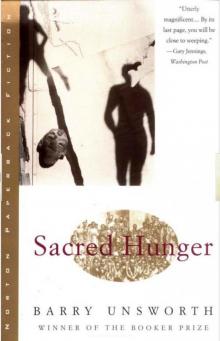 Sacred Hunger
Sacred Hunger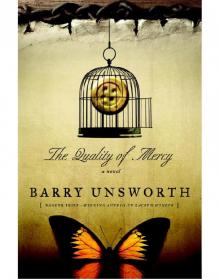 The Quality of Mercy: A Novel
The Quality of Mercy: A Novel The Songs of the Kings: A Novel
The Songs of the Kings: A Novel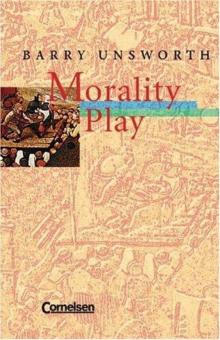 Morality Play. Mit Materialien. (Lernmaterialien)
Morality Play. Mit Materialien. (Lernmaterialien)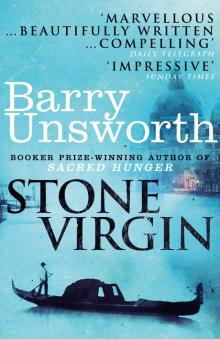 Stone Virgin
Stone Virgin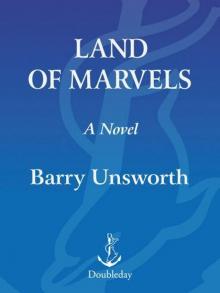 Land of Marvels
Land of Marvels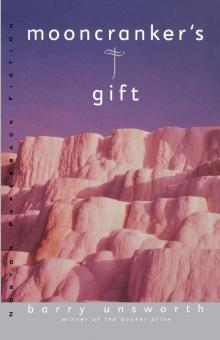 Mooncranker's Gift
Mooncranker's Gift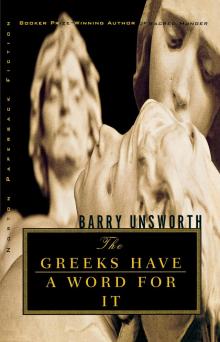 The Greeks Have a Word for It
The Greeks Have a Word for It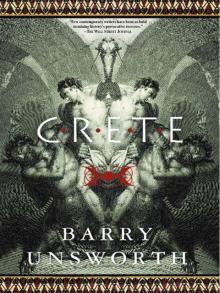 Crete
Crete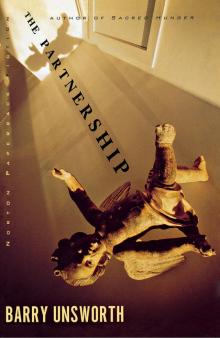 The Partnership
The Partnership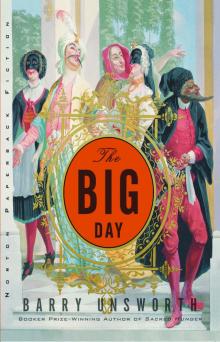 The Big Day
The Big Day The Hide
The Hide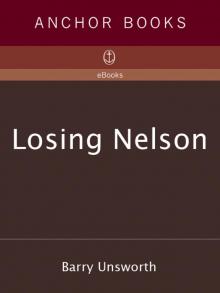 Losing Nelson
Losing Nelson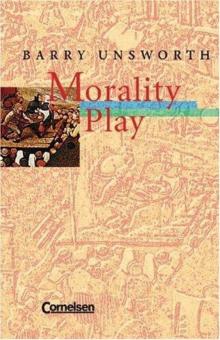 Morality Play
Morality Play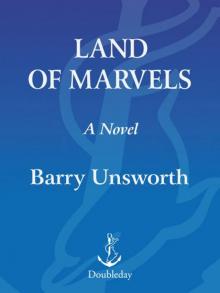 Land of Marvels: A Novel
Land of Marvels: A Novel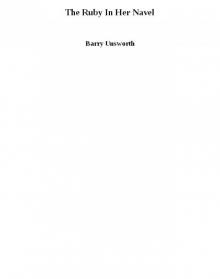 The Ruby In Her Navel
The Ruby In Her Navel